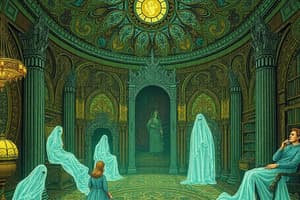Podcast
Questions and Answers
In Bartlett's study, what was the primary technique used to investigate memory reconstruction?
In Bartlett's study, what was the primary technique used to investigate memory reconstruction?
- Control group comparison
- Serial reproductions (correct)
- Random sampling
- Double-blind experiment
What key characteristic of the 'War of the Ghosts' story made it suitable for Bartlett's study on memory?
What key characteristic of the 'War of the Ghosts' story made it suitable for Bartlett's study on memory?
- Its unfamiliarity to the participants' culture (correct)
- Its alignment with Western cultural norms
- Its emotional resonance with participants
- Its simplicity and brevity
According to Bartlett, what is the primary effect of transforming recalled material?
According to Bartlett, what is the primary effect of transforming recalled material?
- It makes the material more accurate.
- It highlights the source of the information.
- It makes the material easier to remember. (correct)
- It preserves the original details.
In Bartlett's view, how do individuals typically reconstruct memories?
In Bartlett's view, how do individuals typically reconstruct memories?
What does Bartlett mean when he says culture powerfully influences us?
What does Bartlett mean when he says culture powerfully influences us?
What is one of the weaknesses of Bartlett's study?
What is one of the weaknesses of Bartlett's study?
What is a potential bias in Bartlett's study?
What is a potential bias in Bartlett's study?
Why might Bartlett's study not reflect everyday memory processes?
Why might Bartlett's study not reflect everyday memory processes?
In the 'War of the Ghosts' study, which of the following transformations was observed in participants' recall of the story?
In the 'War of the Ghosts' study, which of the following transformations was observed in participants' recall of the story?
What type of modification did Bartlett note regarding the phrases used in the recalled versions of the story?
What type of modification did Bartlett note regarding the phrases used in the recalled versions of the story?
How might the lack of specific instructions to participants in Bartlett's study impact the conclusions drawn?
How might the lack of specific instructions to participants in Bartlett's study impact the conclusions drawn?
In the context of Bartlett's research, why is it important to consider the cultural background of the participants?
In the context of Bartlett's research, why is it important to consider the cultural background of the participants?
When participants in Bartlett's study remembered the story, what was the most notable modification they made?
When participants in Bartlett's study remembered the story, what was the most notable modification they made?
How did Bartlett address the challenges of using a culturally unfamiliar story in his memory research?
How did Bartlett address the challenges of using a culturally unfamiliar story in his memory research?
Why might Bartlett's research be considered less controlled compared to modern memory studies?
Why might Bartlett's research be considered less controlled compared to modern memory studies?
What broader implications can be derived from Bartlett's work on reconstructive memory?
What broader implications can be derived from Bartlett's work on reconstructive memory?
How did Bartlett attempt to minimize potential research bias in his study of reconstructive memory?
How did Bartlett attempt to minimize potential research bias in his study of reconstructive memory?
According to Bartlett's research, how does familiarity with a story influence the way it is remembered?
According to Bartlett's research, how does familiarity with a story influence the way it is remembered?
In recalling the 'War of the Ghosts' story, why would participants replace 'canoe' with 'boats'?
In recalling the 'War of the Ghosts' story, why would participants replace 'canoe' with 'boats'?
Which aspect of Bartlett's study suggests a potential limitation in its ecological validity?
Which aspect of Bartlett's study suggests a potential limitation in its ecological validity?
Flashcards
What is Culture?
What is Culture?
The beliefs and expectations that surround us and powerfully influences us.
Bartlett's Hypothesis
Bartlett's Hypothesis
Memories are reconstructed, and recollections transform over time.
Serial Reproductions
Serial Reproductions
A method involving repeated reproduction of a story to observe memory changes.
Bartlett's Key Finding
Bartlett's Key Finding
Signup and view all the flashcards
Transformations Observed
Transformations Observed
Signup and view all the flashcards
Memory Reconstruction
Memory Reconstruction
Signup and view all the flashcards
Lacks Control
Lacks Control
Signup and view all the flashcards
Biased Results
Biased Results
Signup and view all the flashcards
Unusual Story
Unusual Story
Signup and view all the flashcards
Reconstructed Memories
Reconstructed Memories
Signup and view all the flashcards
Study Notes
- Frederic Bartlett conducted studies in 1932, revealing memories are formed through reconstruction.
- Bartlett's hypothesis stated that recollection transforms over time when recalling a story or picture.
- People use familiar expectations to make unfamiliar information more familiar.
- Expectations are based on social and cultural knowledge.
Aim
- Memory reconstruction is investigated when people repeatedly recall information over weeks or months.
- The aim was to use a story from a different culture to observe how cultural expectations affect memory.
Method
- Serial reproductions technique was used.
- Participants heard "The War of the Ghosts" story and reproduced it shortly after.
- The reproduced version was repeated with other participants.
- The story belonged to a different culture that differed from the participants.
- Participants were Bartlett's university students in the UK.
- Bartlett kept record of successive recall protocol.
- The participants did not know the study's real purpose.
Results
- Participants recalled parts of the story and interpreted within their own reference (social, cultural expectation].
- The story was shortened via omissions.
- The phrases were changed to the participant's culture such as 'boats' instead of 'canoe'.
- The recalled version became fixed with slight variation.
Conclusions
- Transformations make materials easier to remember.
- Fragments are remembered and people use knowledge to reconstruct memory.
- Individuals remember meaning and sketch stories using details.
- Reconstructed versions of events are simpler to remember and become memories.
What is meant by Culture
- Culture is the beliefs and expectations around us.
- People are not conscious of living in a culture, just as fish are not aware of living in water.
Lacks control
- The study was conducted casually without standards.
- Participants did not receive specific instructions.
- Other studies found recall more accurate when participants knew recall was important.
The results were biased
- Bartlett's beliefs likely affected his interpretation of the data.
- Conclusions depended on how the results were interpreted.
- Bartlett analyzed each recall to decide what counted as accurate.
- Cannot fully trust the results because of these potential biases.
The story was unusual
- The story's unusualness might not reflect everyday memory processes.
- Memories are not impacted by cultural expectations, so people recall things accurately.
- The study may not be useful for everyday memory.
Studying That Suits You
Use AI to generate personalized quizzes and flashcards to suit your learning preferences.




